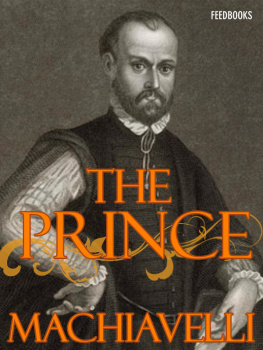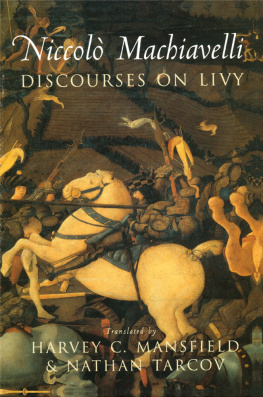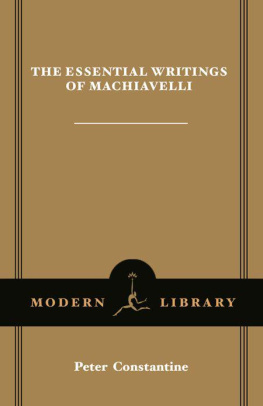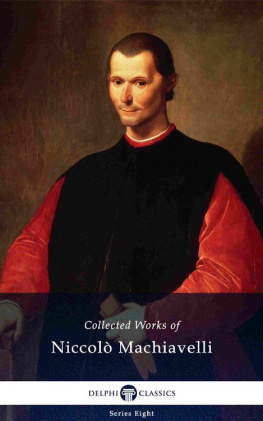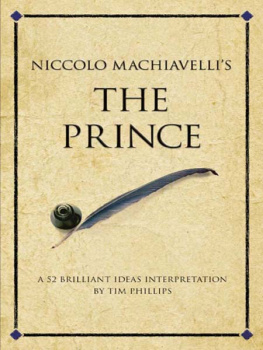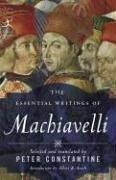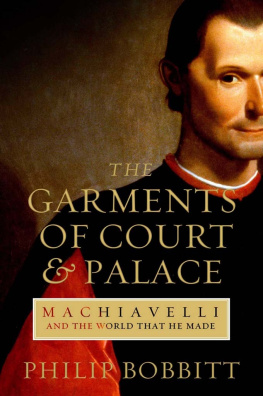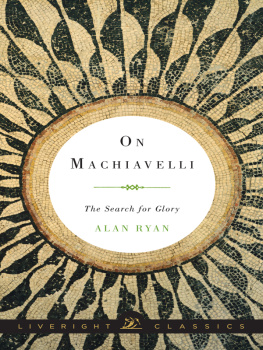About Machiavelli:Niccol di Bernardo dei Machiavelli (May 3, 1469 June 21,1527) was an Italian political philosopher, musician, poet, andromantic comedic playwright. He is a figure of the ItalianRenaissance and a central figure of its political component, mostwidely known for his treatises on realist political theory (ThePrince) on the one hand and republicanism (Discourses on Livy) onthe other. Source: Wikipedia
Also available on FeedbooksMachiavelli: Note: This book is brought toyou by Feedbooks
http://www.feedbooks.com
Strictly for personal use, do not use this file for commercialpurposes.
Dedication: To the Magnificent Lorenzo DiPiero De Medici
It is customary for such as seek a Princes favour, to presentthemselves before him with those things of theirs which theythemselves most value, or in which they perceive him chiefly todelight. Accordingly, we often see horses, armour, cloth of gold,precious stones, and the like costly gifts, offered to Princes asworthy of their greatness. Desiring in like manner to approach yourMagnificence with some token of my devotion, I have found among mypossessions none that I so much prize and esteem as a knowledge ofthe actions of great men, acquired in the course of a longexperience of modern affairs and a continual study of antiquity.Which knowledge most carefully and patiently pondered over andsifted by me, and now reduced into this little book, I send to yourMagnificence. And though I deem the work unworthy of yourgreatness, yet am I bold enough to hope that your courtesy willdispose you to accept it, considering that I can offer you nobetter gift than the means of mastering in a very brief time, allthat in the course of so many years, and at the cost of so manyhardships and dangers, I have learned, and know.
This work I have not adorned or amplified with rounded periods,swelling and high-flown language, or any other of those extrinsicattractions and allurements wherewith many authors are wont to setoff and grace their writings; since it is my desire that it shouldeither pass wholly unhonoured, or that the truth of its matter andthe importance of its subject should alone recommend it.
Nor would I have it thought presumption that a person of verymean and humble station should venture to discourse and lay downrules concerning the government of Princes. For as those who makemaps of countries place themselves low down in the plains to studythe character of mountains and elevated lands, and place themselveshigh up on the mountains to get a better view of the plains, so inlike manner to understand the People a man should be a Prince, andto have a clear notion of Princes he should belong to thePeople.
Let your Magnificence, then, accept this little gift in thespirit in which I offer it; wherein, if you diligently read andstudy it, you will recognize my extreme desire that you shouldattain to that eminence which Fortune and your own merits promiseyou. Should you from the height of your greatness some time turnyour eyes to these humble regions, you will become aware howundeservedly I have to endure the keen and unremitting malignity ofFortune.
Niccolo Machiavelli
Chapter Ofthe Various Kinds of Princedom, and of the Ways in Which They AreAcquired
All the States and Governments by which men are or ever havebeen ruled, have been and are either Republics or Princedoms.Princedoms are either hereditary, in which the sovereignty isderived through an ancient line of ancestors, or they are new. NewPrincedoms are either wholly new, as that of Milan to FrancescoSforza; or they are like limbs joined on to the hereditarypossessions of the Prince who acquires them, as the Kingdom ofNaples to the dominions of the King of Spain. The States thusacquired have either been used to live under a Prince or have beenfree; and he who acquires them does so either by his own arms or bythe arms of others, and either by good fortune or by merit.
Chapter OfHereditary Princedoms
Of Republics I shall not now speak, having elsewhere spoken ofthem at length. Here I shall treat exclusively of Princedoms, and,filling in the outline above traced out, shall proceed to examinehow such States are to be governed and maintained.
I say, then, that hereditary States, accustomed to the family oftheir Prince, are maintained with far less difficulty than newStates, since all that is required is that the Prince shall notdepart from the usages of his ancestors, trusting for the rest todeal with events as they arise. So that if an hereditary Prince beof average address, he will always maintain himself in hisPrincedom, unless deprived of it by some extraordinary andirresistible force; and even if so deprived will recover it, shouldany, even the least, mishap overtake the usurper. We have in Italyan example of this in the Duke of Ferrara, who never could havewithstood the attacks of the Venetians in 1484, nor those of PopeJulius in 1510, had not his authority in that State beenconsolidated by time. For since a Prince by birth has feweroccasions and less need to give offence, he ought to be betterloved, and will naturally be popular with his subjects unlessoutrageous vices make him odious. Moreover, the very antiquity andcontinuance of his rule will efface the memories and causes whichlead to innovation. For one change always leaves a dovetail intowhich another will fit.
Chapter OfMixed Princedoms
But in new Princedoms difficulties abound. And, first, if thePrincedom be not wholly new, but joined on to the ancient dominionsof the Prince, so as to form with them what may be termed a mixedPrincedom, changes will come from a cause common to all new States,namely, that men, thinking to better their condition, are alwaysready to change masters, and in this expectation will take up armsagainst any ruler; wherein they deceive themselves, and findafterwards by experience that they are worse off than before. Thisagain results naturally and necessarily from the circumstance thatthe Prince cannot avoid giving offence to his new subjects, eitherin respect of the troops he quarters on them, or of some other ofthe numberless vexations attendant on a new acquisition. And inthis way you may find that you have enemies in all those whom youhave injured in seizing the Princedom, yet cannot keep thefriendship of those who helped you to gain it; since you canneither reward them as they expect, nor yet, being underobligations to them, use violent remedies against them. For howeverstrong you may be in respect of your army, it is essential that inentering a new Province you should have the good will of itsinhabitants.
Hence it happened that Louis XII of France, speedily gainingpossession of Milan, as speedily lost it; and that on the occasionof its first capture, Lodovico Sforza was able with his own forcesonly to take it from him. For the very people who had opened thegates to the French King, when they found themselves deceived intheir expectations and hopes of future benefits, could not put upwith the insolence of their new ruler. True it is that when a Staterebels and is again got under, it will not afterwards be lost soeasily. For the Prince, using the rebellion as a pretext, will notscruple to secure himself by punishing the guilty, bringing thesuspected to trial, and otherwise strengthening his position in thepoints where it was weak. So that if to recover Milan from theFrench it was enough on the first occasion that a Duke Lodovicoshould raise alarms on the frontiers to wrest it from them a secondtime the whole world had to be ranged against them, and theirarmies destroyed and driven out of Italy. And this for the reasonsabove assigned. And yet, for a second time, Milan was lost to theKing. The general causes of its first loss have been shown. Itremains to note the causes of the second, and to point out theremedies which the French King had, or which might have been usedby another in like circumstances to maintain his conquest moresuccessfully than he did.

